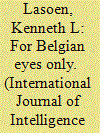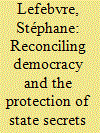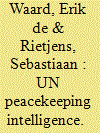| Srl | Item |
| 1 |
ID:
153166


|
|
|
|
|
| Summary/Abstract |
The Kingdom of Belgium has two intelligence services. The domestic State Security service, the Veiligheid van de Staat–Sûreté de l’Etat (VSSE), was established in 1830. A military intelligence service, the Algemene Dienst Inlichtingen en Veiligheid–Service Général du Renseignement et de la Securité (ADIV/SGRS–ACOS-IS1 Within the Belgian Defence flow chart, the service is known as ACOS-IS, Assistant Chief of Staff Intelligence and Security.
), was established in 1915 to provide intelligence for the military and act as a security service for the Belgian Army’s operations.
|
|
|
|
|
|
|
|
|
|
|
|
|
|
|
|
| 2 |
ID:
153171


|
|
|
|
|
| Summary/Abstract |
“To show the fly the way out of the fly bottle”—that, Ludwig Wittgenstein said, was the aim of his philosophy.
|
|
|
|
|
|
|
|
|
|
|
|
|
|
|
|
| 3 |
ID:
153167


|
|
|
|
|
| Summary/Abstract |
South Africa has had a tortuous legal past. Its racial discrimination and segregation system, initiated by colonial rulers, became legal under of the National Party’s system of apartheid from 1948 to 1994. Under the appearance of the rule of law, non-whites were marginalized in all aspects of life, forcibly confined to geographic areas, and prevented from participating in decisions affecting their country’s destiny.
|
|
|
|
|
|
|
|
|
|
|
|
|
|
|
|
| 4 |
ID:
153169


|
|
|
|
|
| Summary/Abstract |
Little has been written about India’s intelligence capabilities and history, and even less that analyzes key moments of its history. The Indian government restricts public access to information about its intelligence agencies, and its officers have traditionally been discouraged from writing about their work, both by their peers and threats of prosecution. Recently, however, former intelligence officials have defied the norm by writing biographies and making public statements that shed light on this neglected subject.
|
|
|
|
|
|
|
|
|
|
|
|
|
|
|
|
| 5 |
ID:
153165


|
|
|
|
|
| Summary/Abstract |
In International Relations literature, much attention has been given to how a regime affects battlefield effectiveness and strategic decisionmaking. These efforts seek to explain statistical findings that democracies have won most of the wars in which they were engaged. Those called “triumphalists” argue that democracies have better strategists and war-fighting machines.1 Dan Reiter and Allan C. Stam, Democracies at War (Princeton, NJ: Princeton University Press, 2002).
[Crossref], [Google Scholar]
Their critics are “realists” who hold that regime type does not matter.
|
|
|
|
|
|
|
|
|
|
|
|
|
|
|
|
| 6 |
ID:
153170


|
|
|
|
|
| Summary/Abstract |
Today’s military missions are often broad in scope and face a multitude of political, socio-economic, and security challenges. Enemy-centric intelligence is therefore no longer sufficient. Based on their experiences in Afghanistan, retired General Michael T. Flynn and his colleagues noted that U.S. and allied forces were unable to answer the fundamental questions about their operational environment and the people they sought to persuade:
|
|
|
|
|
|
|
|
|
|
|
|
|
|
|
|
| 7 |
ID:
153172


|
|
|
|
|
| Summary/Abstract |
Gathering intelligence is a primary tactic enabling policymakers and military strategists to make informed decisions. Intelligence officers use a variety of tactics to gather human intelligence (HUMINT) from a myriad sources. Intelligence acquisition utilizes a complex system that begins with activating resourceful agents and ends with the analysis of gathered information. This multistep system is crucial for strategic decisionmaking and policy implementation. The effort here is to distinguish among the different communicative and psychosocial-based compliance gathering tactics used by intelligence agencies and the skepticism surrounding their validity, while showing how Communication as an academic discipline could benefit from a closer examination of how communication behavior and compliance gaining tactics are used to detect deception.
|
|
|
|
|
|
|
|
|
|
|
|
|
|
|
|